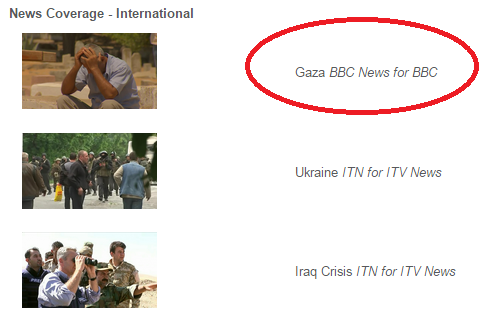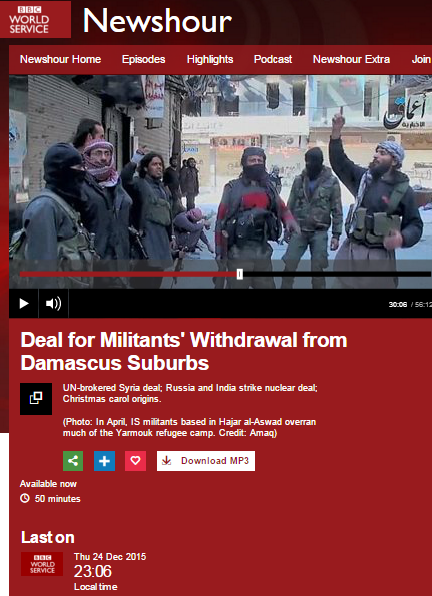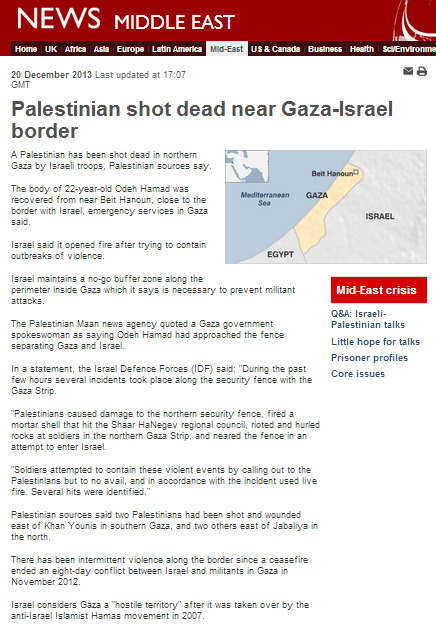In part one of this post we saw how presenter Mishal Husain gave listeners to BBC Radio 4’s ‘Today’ programme on June 26th a very partial view of the Arab Peace Initiative and promoted the notion that the United States had “killed hopes of a Palestinian state”.
Later on in the programme (from 2:35:28 here) listeners heard a seven and a half minute long item concerning the Bahrain economic workshop taking place on that day which was introduced by Husain using the same framing.
Once again Husain refrained from informing audiences that Hamas does not support the Arab Peace Initiative and – as in all BBC coverage of the Bahrain workshop – she misleadingly presented “the Palestinians” as a homogenous group, failing to clarify both that Hamas opposes any peace plan and that some Palestinian businessmen did take part in the conference.
[emphasis in italics in the original, emphasis in bold added]
Husain: “A US sponsored conference on economic development in the Palestinian territories has opened in Bahrain. Jared Kushner says it’s the opportunity of the century – part of his father-in-law Donald Trump’s Middle East peace plan, which has not involved the Palestinians at all. As the event began Mr Kushner spoke of any future peace deal not being along the lines of the widely accepted Arab Peace Initiative which envisages a Palestinian state alongside Israel. I’ve been speaking to Danny Danon, Israel’s ambassador to the UN. But first, Michael Lynk – UN Special Rapporteur on Palestine.”
Michael Lynk’s actual title is “Special Rapporteur on the situation of human rights in the Palestinian territories occupied since 1967”. Husain made no effort to inform listeners of his “particular viewpoint” as required by BBC editorial guidelines on impartiality and so they had no idea that behind the ostensibly ‘neutral’ statements they heard from a UN representative lies a long record of anti-Israel activity.
“Michael Lynk […] plays a leadership role in numerous Arab lobby groups, including CEPAL, which promotes “Annual Israeli Apartheid Week” events; signs anti-Israel petitions; calls to prosecute Israel for alleged war crimes; addresses “One State” conferences that seek to eliminate Israel; and argues that “the solution” to “the problem” must go back to Israel’s very creation in 1948, which he calls “the start of ethnic cleansing.””
Unsurprisingly to anyone who is familiar with Michael Lynk, he had nothing at all to say about Palestinian terrorism.
Lynk: “On the one hand the concept of building a prosperous and vibrant Palestinian economy is one that we would all support but trying to put an economic peace ahead of political settlement I think is almost certainly going to fail and the most important reasons for the feeble Palestinian economy are tied to the 52-year-old Israeli occupation.”
Husain: “But traditionally the political settlement idea has been pursued first and that hasn’t worked. Is it possible that by putting the focus on economic prosperity you might create a different climate for political solutions to be talked about?”
Lynk: “I think not. You know, in order to have a successful economy any country is going to need control over its own territory, the ability to trade and to export, the ability to develop a vibrant labour market, the ability to create a supportive investment infrastructure and the Palestinians have none of these economic freedoms. Unless you solve the political problem first and end the occupation, any focus on the economy I believe is going to be doomed.”
Husain failed to clarify to listeners that, despite the security measures made necessary by Palestinian terrorism, the Palestinians did manage to export 94.8 million dollars-worth of goods in 2017. She went on to re-promote her partial framing of the Arab Peace Initiative, making no effort to inform listeners of its additional aspects – in particular those relating to Palestinian refugees – which make it a non-starter.
Husain: “Well it would seem from Jared Kushner’s envisaging of a way to solve the political problem…I mean he has…he has said the Arab Peace Initiative – this is the plan that envisages two states, one Israeli, one…one Palestinian – ahm…will not happen. ‘If there is ever a deal it’s not going to be along the lines of the Arab Peace Initiative’ he said. ‘Any future deal will be somewhere between that initiative and the Israeli position’. So it seems that – as many people would have suspected for some time – that the two state solution is dying or already dead.”
Listeners then heard Lynk’s interpretation of the two-state solution which, unsurprisingly, dovetails with that of the PLO – including the erroneous notion of “’67 borders”.
Lynk: “Yes and I agree with you. You know the…keep in mind that the international community has for a long time laid out what are the essential elements of a final political settlement between the Israelis and the Palestinians. It means an independent, contiguous Palestinian state based on the ’67 borders alongside of Israel. It means a Palestinian capital in East Jerusalem. It means an absolute end to the illegal Israeli settlements. It means a just solution for the Palestinian refugees and it means obviously guarantees. That’s not what we’ve been hearing from the statements being made by the three advisors on the Middle East peace plan. They’ve given their blessings to Israeli annexation of parts of the West Bank – which is illegal under international law. They have envisaged something much less than a fully sovereign Palestinian state. None of this is any basis for trying to build trust that you’re leading towards a viable, just and fair settlement for both sides.”
Following that unchallenged promotion of PLO talking points from a supposedly ‘neutral’ source, Husain moved on to tick the ‘impartiality’ box with her next interviewee, telling listeners what “is absent from this plan” even though the relevant part of it has yet to be published.
Husain: “Ehm…let me turn to Danny Danon – Israel’s ambassador to the United Nations – who is listening to you, Michael Lynk. Ambassador Danon; isn’t it true that any real concept of peace involves political and economic freedom and that is absent from this plan?”
Danon: “Well I think it is unfortunate that you have a very important discussion taking place and the Palestinians are again ignoring it. So we welcome the US initiative. We are open-minded to discuss new ideas. But we all know that in order to move things on the ground, you need all the parties engaged. Today the Palestinians are saying out loud ‘we do not recognise the Israelis as partners, we do not recognise the US as mediators’ and it is unfortunate.”
Husain then took on the role of Palestinian advocate.
Husain: “Well, to not recognise as mediators, that is because this administration has shown very clearly which side they favour in all the actions that they have taken so far and the reason the Palestinians aren’t there at this event is because it is not discussing all issues. It is not discussing any of the political issues.”
Danon: “So as we know this is only the first part of the plan. We will have to wait to see the entire plan and to discuss it.”
Husain: “When is the rest of the plan coming?”
Danon: “It is up to the US administration to decide about that. We presume it will be after the elections in Israel and I don’t know if we will support everything in the plan but we respect the efforts and we welcome the involvement of very original partners and I think the fact that you have today Arab countries coming together, I think this is the right way to move forward.”
Despite having just acknowledged that the political part of the plan has yet to be published, Husain once again went on to claim to know what it includes.
Husain: “The long struggle of the Jewish people for self-determination and for your own homeland: you would never have accepted the sort of state that is now being put forward for the Palestinians – if you can even call it a state – somewhere where there are no full political rights alongside any economic rights.”
Danon: “So I think when you look at the history of the Jewish people we never had an ambition to hurt anyone else, to support terrorism or to encourage incitement. And I published an op-ed at the New York Times yesterday where I think it’s about time that the Palestinians will look at the future and not the past. For example, take the payment they are paying for convicted terrorists. Why they have this culture of hate? Let’s move on, recognise Israel and negotiate with Israel.”
Mr Danon’s op-ed can be found here.
Husain: “In that piece you wrote you used the word ‘surrender’. You said ‘there is nothing wrong with Palestinians surrendering – that would create the opportunity to transform Palestinian society’. I mean that, they would say, is a very offensive way to…to talk about their struggle for their rights.”
Danon: “You have to read the entire article because I use the word surrender to surrender their ideas of moving the Jews out of Israel…”
Husain interrupted with her own very revealing interpretation of the idea that Palestinians should accept that the Jews are not going to be driven out of the region:
Husain [interrupts] “To surrender their dream of statehood.”
Danon: “…and preaching of hatred. They should forget about that. We are there to stay and they should accept that. They should teach their children that that is, that Israel is there to stay. In order to move forward we have to recognise Israel and we have to see how we can live together or one side by side with the other and move forward. Until they will not do that they will stay where they are. And look what’s happening today: Israel is booming, our economy is stronger than ever and they are staying behind.”
Once again Husain promoted a strawman:
Husain: “Are you saying they should accept there will be one state in the future – the Jewish state?”
Danon: “I say they should enter the room. It’s legitimate that they will come with their own aspirations, their own demands, requests, requirements. And we will come with ours. You know, the international community can help and I think the financial help is well appreciated but at the end it will be us and the Palestinians living there. That’s why eventually we will have to engage in a direct dialogue.”
Apparently reluctant to close the item on that note, Husain let the partisan UN rapporteur have the last word.
Husain: “Michael Lynk: just a final thought from you. Do you think that the Palestinians should be engaging in this dialogue, however much they object to the terms in which it’s framed?”
Lynk: “Well that’s entirely up to them. You know, to be clear, as a UN special rapporteur I don’t speak for the Palestinians and I don’t speak for the UN. Really the question which I can answer is is this particular path or vision likely to lead to a just and durable peace and as I’ve said. I cannot see it.”
Husain rounded off the item with yet another misrepresentation of Lynk’s title:
Husain: “Michael Lynk, UN Special Rapporteur on Palestine, Ambassador Danny Danon of Israel, thank you very much.”
So what could Radio 4 audiences learn from this item? They heard a partisan and incomplete portrayal of the Arab Peace Initiative with no explanation of why it has gone nowhere in the seventeen years since it was produced. They were led to believe that that inadequately presented initiative is the only game in town and that by not embracing it in its entirety, the US has “killed” the chances for a Palestinian state. They got a one-sided explanation of the two-state solution which complies with the PLO’s interpretation of that concept. They heard Mishal Husain purport to tell them what is in a plan that has not yet been published. They did not however receive any information concerning the Palestinians’ repeated rejection of peace plans based on the two-state solution and the sole reference to Palestinian terrorism came from the Israeli interviewee.
In other words, as the BBC’s tight framing of the topic of the Bahrain economic workshop continued, audiences were once again denied the full range of information which would enhance better and comprehensive understanding of the topic.
Related Articles:
BBC’s Mishal Husain promotes dubious peace plan framing – part one
BBC News website’s explanation of the two-state solution falls short
BBC News amplifies PLO’s interpretation of the two-state solution
BBC ignores UNHRC’s nomination of controversial official




